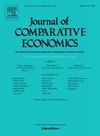Professional motivation and the quantity–quality trade-off
IF 3.1
2区 经济学
Q1 ECONOMICS
引用次数: 0
Abstract
How can professionals be motivated to do better quality work? This paper examines this question through a unique lab-in-the-field experiment on more than 100 judges in a lower middle income country, Tajikistan. I test how judges respond both to monetary bonuses and to anonymous monitoring by peers of the quality of their work. I find that the provision of bonuses leads to much lower quality than in a control group where bonuses are not given. However, offering a bonus while also making work visible to peers motivates the judges to increase both quantity and quality. Random peer monitoring of work is likely triggering concerns about self-image which mitigate the negative effect of bonuses on quality. The results have important implications in labor market settings where strict monitoring of quality is not possible.
职业动机与数量-质量权衡
如何激励专业人员更好地完成高质量的工作?本文通过对中低收入国家塔吉克斯坦的100多名法官进行独特的现场实验室实验来研究这个问题。我测试了法官对奖金和同行对其工作质量的匿名监督的反应。我发现,与不提供奖金的对照组相比,提供奖金导致的质量要低得多。然而,在提供奖金的同时,让同行看到自己的作品,会激励评委提高作品的数量和质量。随机的同事监督工作可能会引发对自我形象的担忧,从而减轻奖金对工作质量的负面影响。研究结果对无法严格监控质量的劳动力市场环境具有重要意义。
本文章由计算机程序翻译,如有差异,请以英文原文为准。
求助全文
约1分钟内获得全文
求助全文
来源期刊

Journal of Comparative Economics
ECONOMICS-
CiteScore
4.40
自引率
0.00%
发文量
66
审稿时长
45 days
期刊介绍:
The mission of the Journal of Comparative Economics is to lead the new orientations of research in comparative economics. Before 1989, the core of comparative economics was the comparison of economic systems with in particular the economic analysis of socialism in its different forms. In the last fifteen years, the main focus of interest of comparative economists has been the transition from socialism to capitalism.
 求助内容:
求助内容: 应助结果提醒方式:
应助结果提醒方式:


